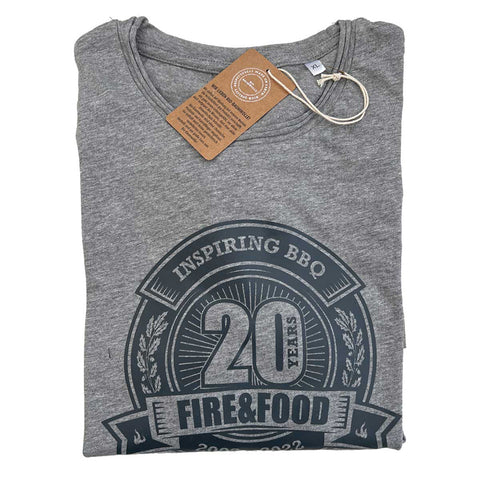Burgers for a better world and big business
You're sure to experience this more and more often: alongside the grill classic, a "real" beef hamburger, there is actually a meatless version sizzling away. Ever since the run on Lidl, where many consumers tried - mostly in vain - to get their hands on the vegan Beyond Meat Burger, it's clear that Germany is open to plant-based, i.e. plant-based and vegan patties. How come? People have to eat. They want to eat well. But tasty is no longer enough. It has to be healthy. Values count, such as animal welfare, environmental and climate protection. This brings conscious nutrition and thus automatically the search for alternative proteins to the table. It doesn't have to be a vegan lifestyle. But today even die-hard fans of the classic burger want to have the opportunity to try new things. That means that consumers are open to it and with it the market. But who actually made it? FIRE&FOOD Food Scout with Andrew Fordyce.
Vegan Wave
The development of awareness towards a sustainable diet has a long history, which probably began with the founding of the Vegan Society by Donald Watson in England in 1944. In addition to the political discussion, what gave the matter enormous momentum was the street food revolution at the beginning of the new millennium, which started in Great Britain. It provided the impetus for individual, health-oriented recipes based on sustainably sourced, usually regional products. This made the UK a kind of pioneer for veganism, a position it still holds today: 16 percent of all new food products are vegan. That is the highest percentage in the world. The street food wave spread continentally and intercontinentally and ultimately kick-started innovation not only in the preparation and proven origin of products, but also in their composition. In other words: food production moved, especially in the USA, from farmland to research laboratories. This gave the development a kick in a new direction. Since then, "vegan" has not been a bad word, but a business term: veganomics.
Pat Brown saw industrial animal farming as the biggest environmental problem and was one of the first to find his mission in producing meat and dairy products from plants.
Pat Brown has already been considered a candidate for the Nobel Prize in Chemistry. Just to round out the message.
Values with more value: The new burger kings
By 2030, a billion more people will need to be fed, despite the fact that even today the world's meat needs cannot be met and environmental damage is considered irreparable. This is a sign of an ecological catastrophe that is mistakenly giving rise to economic careers, as the example of Impossible Foods shows. Founder Pat Brown, a Stanford biochemistry professor, saw industrial animal farming as the biggest environmental problem and was one of the first to find his mission in producing meat and dairy products from plants. He shifted food production not only by choosing the location of his company to the American technology center of Silicon Valley. This is also where he found several of his investors, such as Google Ventures and Bill Gates. They recognized not only the relevance of the problem, but also the powerful message behind the mission. This is visionary when you consider that Americans eat around 50 billion meat burgers and are now being converted to plant-based ones.
But the investors' plan worked. The alliance of a brilliant idea, resource capital for further research, marketing and production, as well as well-known investors and contacts who are on first-name terms at various levels, both economically and politically, was certainly a key factor in the successful startup. This also explains the shooting star career of the Plant Based Impossible Burger, launched in the USA in 2016. After meat substitutes from Impossible Foods were already being offered all over America by the burger chain White Castle, it was only three years later that it entered the burger nobility: as the Impossible Whopper at Burger King with a truly royal broad impact for a better world thanks to plant-based food.
Appetite for growth
The hype surrounding alternative proteins has now reached a new level. This can be seen in the Beyond Burger, which whetted the appetite in several ways. Not only because it tastes good and you can enjoy it without feeling guilty. Eating healthily can also be profitable in other ways. This has led to virtually everyone wanting to invest. At the beginning of May 2019, Beyond Meat went public in the USA and its price went through the roof. The initial share was traded at 25 US dollars - at the end of the day there was a 150 percent premium and the share was at 65 dollars. The price rally rose to 186.43 dollars until a revaluation by JP Morgan, which caused the share price to fall to around 130 dollars. Of course: the further course must be followed carefully - like every share. As with the Impossible Burger, Beyond Meat has a strong backup. Again you can find Bill Gates, but also Leonardo Di Caprio and the two Twitter founders Evan Williams and Biz Stone. It is interesting that the meat processing industry, Tyson Food, is also represented among the investors - alongside the animal rights organization Human Society of the United States. If you look twice, you will even discover Amazon, under whose umbrella the actual investor, Whole Foods, a grocery retailer, is located.
Grill the Burger: David vs. Goliath
Let's come back to the topic of initiators. Who are the trend makers? Food companies, restaurants, wholesalers or retailers? Hardly! At the beginning of the sustainability revolution in our food system are the ideally controlled foodies among the Gyro Gearlooses, who as small start-ups do everything they can to create flawless, resource-oriented innovative products and place them on the market. The hurdles they have to overcome are copyability, competitive positioning or time-to-market, market power of other food players such as wholesalers, regulations, quality, resource or product assurance and, and, and.
Most of the time they fail to overcome these hurdles because they lack the capital and know-how. This is the basis for a TV format like "The Lion's Den". The foodie here is Frank Thelen, who knows about these problems and founded the Food Family, in which each company operates independently, but where people help each other - like in a family - above all through exchange. Germany - unlike the UK or the USA - is relatively reserved about its willingness to invest in the food sector and largely ignores the opportunities offered by veganomics in particular. The banks in particular are literally missing out on promising big business made by plant-based burgers or other innovative foods that could bring a better world to all of us.
Food giants
A completely different construct exists at McDonald's, which has entrusted itself to another food company to produce its Big Vegan TS. The burger comes from Garden Gourmet, a subsidiary of the Swiss food multinational Nestlé. With Garden Gourmet, Nestlé is certainly following an innovation and reduction strategy that is present in many people's minds these days and, in relation to McDonald's, aims to try out alternatives to meat. When food companies are involved, this always raises the question of transparency, especially when it comes to where raw materials come from and at what prices they are purchased, or what impact this has on local and regional markets. Regardless of this, the animal rights organization PETA attests on its website that the Big Vegan TS has an authentic McDonald's taste, thanks to a patty that is not made of quinoa or vegetables, but one that is reminiscent of meat, thus following its strategy of promoting vegan options to non-vegan companies. Ultimately, it's about taking a step in the right direction, which means having the choice for a plant-based product and, in this case, supporting animal welfare in particular. In this case, the output through publicity is what counts.
Beyond Meat is putting pressure on the cheap meat market and any future meat scandal will only increase this effect.
FIRE&FOOD opinion:
Beyond Meat – hardly any other topic has sparked such a heated debate in our editorial office recently as this one. It is undisputed that the topic has gained attention and thus an importance that goes far beyond the vegan and vegetarian clientele. And this is precisely where we agree again. Because regardless of how you personally assess this hype and whether pea protein really has what it takes to feed the world in a healthy way: Beyond Meat is putting the cheap meat market under pressure and any future meat scandal will only intensify this effect. This can also be seen in the fact that the food and meat industry is willingly jumping on this bandwagon with its own ideas. It operates very differently to our automobile industry and apparently wants to be prepared when the meat-free trend in the mass segment increases and consumers increasingly have the choice of choosing meat from questionable origins or plant-based protein sources. This is clearly about market power and position. In return, the quality of meat will have to be increased in order to continue to convince consumers in the future. Starting with animal rearing, through husbandry, to slaughter. Controlled and verified by independent quality seals such as the FIRE&FOOD meat scout seal. A process in which consumers, farmers, butchers – and of course the animals – can all benefit.





















